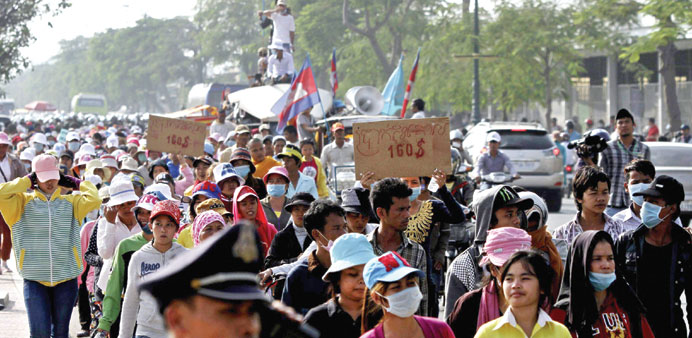|
Cambodian garment factory workers Then Any and Vong Pov aren’t showing up for work anymore. |
They make pairs of jeans sold in American stores at prices per pair higher than their $80 monthly income and struggle to make ends meet.
It sounds like an all-too familiar story of labour disputes in one of Asia’s poorest countries, but this time it’s different. Their strike has taken on a new significance and is presenting a rare challenge to one of the world’s longest-serving leaders, Prime Minister Hun Sen.
The pair are just 18 and have only basic education, but are among 350,000 new and powerful allies of a political opposition seeking a re-run of a July election they say was stolen from them by the ruling Cambodian People’s Party (CPP).
Huddled behind barbed wired fences and stared down by riot police outside Hun Sen’s offices are hundreds of factory workers demanding a doubling of wages and threatening to shut down roads and cripple an industry worth $5bn a year.
“I can’t feed myself,” said Then Any, as workers hurled water bottles towards police lines.
Vong Pov added: “Factories must give us a raise, otherwise, we will strike continuously.”
Instrumental in courting support of disgruntled workers who make clothes and footwear for brands like Adidas, Gap and Nike is Sam Rainsy, whose once-impotent party reinvented itself this year to tap resentment and present Hun Sen with an unprecedented electoral challenge.
Rainsy has led the Cambodia National Rescue Party (CNRP), its supporters and now garment workers on rallies and marches of tens of thousands of people in the past two weeks, demanding Hun Sen agree to a new election after he rejected calls for an independent probe into results of the July poll.
Protests of this scale are rarely seen in Cambodia, where despite his authoritarianism, the self-styled “strongman” has steered the country from a failed state to an unprecedented spell of stability and growth after civil war and the horrors of the 1970s Khmer Rouge “killing fields” rein of terror.
“This is about the incapability of the ruling CPP, the people want them out,” said top CNRP member Yim Sovann.
“We have no other options other than to demand for the election reforms and another election.”
The CPP won 68 seats in the July election to the CNRP’s 55, according to the National Election Committee, but CNRP says that body is one of many under CPP’s influence and maintains it was cheated out of 2.3mn votes.
Hun Sen, 61, has been in power for 28 years and has vowed to rule Cambodia into his seventies. He appeared to have rode through protests that fizzled out a few months ago, but the opposition has returned to the streets with reinforcements from unions representing nearly 500 factories.
The government recently agreed to increase the monthly minimum wage for garment workers from $80 a month to $95, but CNRP says it would push that to $160 if it wins an election.
The protests have put the government in a tight squeeze and many Cambodians worry security forces with a reputation for zero tolerance will crack down harshly.
CPP lawmaker Cheam Yeap said pay rises should be incremental and workers were unaware of the damage they could cause.
“They’re strangling themselves,” he said. “When investors close factories, we can’t find hundreds of thousands of jobs for the people. Businesses are worried. They might say ‘bye bye’.”
The Labour Ministry on Monday threatened six unions with lawsuits and ordered factories to reopen and workers to return by Jan 2, vowing “serious measures” against non-compliance.
Ou Virak, a political analyst and human rights advocate, said the situation was precarious and the government’s strategy was not to cave in, but to cling on and hope protesting workers run out of money.
“The ruling party is nervous,” he said. “Will they respond with more concessions? Or with crackdowns to guarantee their continued rule?”
“This is untested territory for the ruling CPP. They know how to fight wars and battles, but not when people are taking to the street in such masses.”

